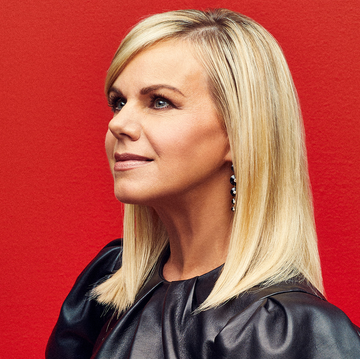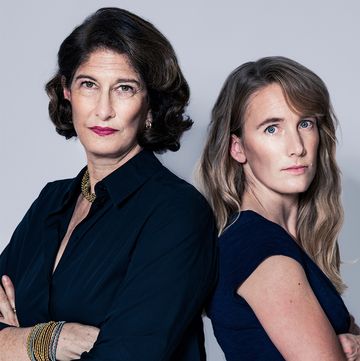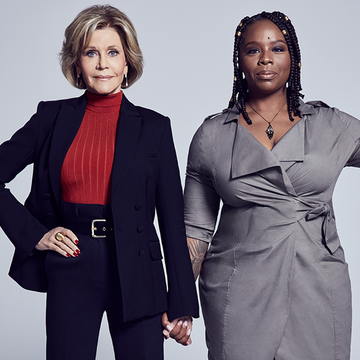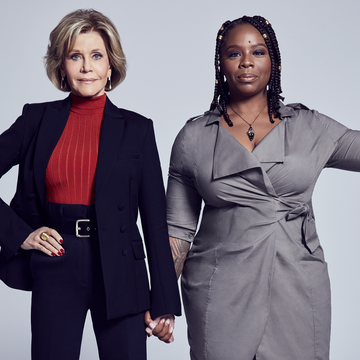The new generation of #WomenWhoDare are those who refuse to conform. They dare to do the impossible, encouraging young visionaries to break—not just push—boundaries, inspiring people worldwide to fight for what they believe in. Earlier this week, the first openly transgender woman of color was elected to public office in Minnesota, and Virginia elected the first openly transgender person to state legislature. For our 2017 Women Who Dare series, Jess Herbst—who made history as the first openly transgender mayor in Texas—opens up about her own fight for LGBTQ rights in a town that voted for Trump.
New Hope isn’t the kind of place you would associate with being on the front lines of LGBTQ equality.
An hour’s drive from Dallas, the tiny Texas town counts just 633 residents. The rural community is a small collection of farms and doesn’t have much of a downtown area. There’s only one store within the city limits. Like many other small towns in the reddest areas of the country, New Hope voted for Donald Trump in the 2016 election. Nearly 59 percent of voters in the surrounding Collin County, which is dotted with Trump-Pence signs in residents’ front lawns, cast a ballot for the Republican candidate.
But New Hope was thrown into the national spotlight in January when its mayor, Jess Herbst, came out as transgender.
The 59-year-old, who came out to constituents with a letter posted to the town’s website on January 24, is the first trans person to hold major political office in the state of Texas. And she’s only the second transgender politician to sit in the mayor’s office in the U.S., following Oregon’s Stu Rasmussen. Rasmussen, who served as the mayor of Silverton for six years, stepped down in 2015—making Herbst the only person to currently hold the title.
Herbst, who had just finished yard work outside the home she shares with her wife and two daughters, tells me that she didn’t think her coming out would be “such a big deal.”
“I wasn’t the first,” she says over the phone. “Just the first in Texas. Someone had been there before me.”
Reaching this extraordinary milestone wasn’t ever part of Herbst’s plan. When her predecessor, Johnny Hamm, ran for reelection in 2016, she was an alderman on the town council. But Hamm, who had been mayor for 22 years, suddenly had a heart attack days before the election. He still won the race. Herbst, who acted as mayor pro tempore following Hamm’s death, was nominated to be his replacement.
When she won the seat, Herbst was still in the closet to colleagues and members of the town. She always thought that if she chose to transition publicly, she would quietly step away from political life. That was suddenly no longer an option.
“For the majority of my life, my biggest guarded secret was my gender identity,” she says. “I thought if it ever got out that it would ruin me.”
Herbst’s journey to living authentically was a decades-long struggle, one that began at a time when most Americans didn’t know what it meant to be transgender. When she was just three years old, Herbst would drag dresses out of her mother’s closet and try to wear them. Her parents sent Herbst to a psychiatrist when she was 12, after getting caught snooping around in her mother’s lingerie. The doctor recommended that Herbst’s father “man her up.” He took her to sporting games and forced her to play football, hoping to make her like the other boys.
The psychiatrist also advised that Herbst, who claims that she was a “pudgy” child, be put on a strict exercise routine. The idea was that she would become more masculine by shedding her baby fat. If the preteen refused to go along with the program, the doctor told Herbst’s parents to beat her with a wooden paddle.
“I just had to hold my feelings in,” she says. “It’s what I was taught. It was literally beat into me to not express my femininity.”
Herbst says her daughters, both graduates of the University of North Texas, have been supportive of her gender identity. Their only objection was an aesthetic one. Her children didn’t want her to “dress inappropriately,” Herbst relates with a laugh. The girls were worried their new mother would be a fashion disaster. So years after Herbst was forced to put the dress back in the closet, her oldest daughter helped her symbolically pull it back out, giving Herbst makeup tips, and instructing her in the ways of womanhood.
It wasn’t so easy, though, for Herbst’s wife.
Herbst met Debbie Gray at a screening of The Rocky Horror Picture Show in the late 1970s when they were both students at East Texas State University (which has since incorporated into Texas A&M). The two got seated next to each other among their group of friends. But Herbst was already very aware who the young woman on the other side of the armrest was. The first time she saw her future wife was on campus; Gray had just come back from vacation in Acapulco. Herbst describes the vision of Gray walking toward her on the quad as “the most beautiful thing she had ever seen.” Gray was tall and thin with a sunbather’s tan, dark brown hair cascading down her back.
Gray knew about Herbst’s feelings of gender difference since before they were married in 1978. Her wife encouraged Herbst to explore and experiment, wearing women’s clothing around the house. They would call it “Lucy time,” which was the name that Herbst dabbled with before settling on Jess.
“We thought I was the only one,” Herbst says. “We didn’t know anyone else felt this way. We did this behind closed doors, curtains drawn so the neighbors wouldn’t see.”
This was well before Laverne Cox and Janet Mock, back when transgender people had extremely few possibility models. But the advent of the internet would give Herbst the ability to do research and get connected to support groups of other people going through the same things she was. For the first time, Herbst found out that she wasn’t alone.
That realization triggered a series of baby steps, ones that resulted in Herbst coming out to the world. She started by going to the grocery store and the movie theater dressed in feminine clothing. After Herbst was elected mayor in 2016, she went on a six-month campaign of coming out to friends, family, and colleagues. It took her all through the summer and through the fall. Herbst says that she didn’t want old friends from high school to have to hear about her transition from the local newspaper.
Around this time, Herbst’s wife went through a year-long depressive episode.
“It took a while to put her finger on what it was,” she says. “This idea she had of growing old with a man wasn’t going to happen, but I’m still the same soul and the same mind I’ve always been. It just took time to come to grips with it.”
After getting elected mayor, Herbst knew that she couldn’t live in the closet her entire term: living as her true self among friends and family while presenting another person to the public. Herbst felt it her duty to be honest be honest with constituents she represents, even if that meant the end of her career. She thought that her colleagues on the town council would ask to tender her resignation immediately.
“I knew I couldn’t be mayor while transitioning and people not know about it,” she says. “I wanted to own the story. I didn’t want someone to find out that I was transitioning and use that against me.”
But the fears of disgrace she had harbored for so long didn’t bear fruit. Not a single person asked her to step down.
When Herbst held her first city council meeting as Jess, she took five minutes at the beginning of the session to come out to those gathered. Her colleagues already knew, but it was possible that citizens who had gathered at the meeting didn’t. Because New Hope is so small, word doesn’t have to travel that far to reach the whole town. But maybe someone hadn’t pressed their ear the grapevine.
Of the 10 to 15 community members present, no one made her gender identity an issue.
One New Hope resident, who had referred to transgender people as having a “mental disease” just days prior on Facebook, showed up to the meeting with a more conciliatory tone. “Hey, whatever you want to do,” Herbst’s former critic told her. “As long as you can get your job done.”
Although Herbst says there’s been “zero backlash,” her election has been a learning process for New Hope. For most people in the town, Jess is the first first transgender person they’ve ever meet. Residents often come up to her to see if she’s okay with answering some of their questions, and she tells constituents they’re allowed to ask anything. The questions often get extremely personal: When did she know she was transgender? What surgeries has she gotten? What’s going on down there?
Education isn’t always easy. Nine months after posting her coming out letter, colleagues still occasionally misgender her and then immediately correct themselves. “Oh, I’m so sorry—‘she,’” they say, embarrassed. Herbst tries to be understanding. The council members have known her as someone else for 20 years, so they’re likely to make mistakes.
“I was expecting to defend myself, but I haven’t really had to do that,” Herbst says. “I think I’ve challenged people.”
But the real challenge that lay ahead was the political climate that awaited Herbst as she stepped into the public eye. Herbst came out four days after Donald Trump was inaugurated to the presidency. Since taking office, his administration has doggedly rolled back LGBTQ rights: banning trans troops from serving openly in the military, erasing nondiscrimination protections for transgender federal employees, and reversing Obama-era policies allowing trans students to use the restroom that matches their gender identity in schools.
In addition, Texas lawmakers pushed a cascade of legislation targeting the trans community in 2017. Proposed bills would have nullified all LGBTQ-inclusive nondiscrimination protections and forced transgender people across the state to use public bathrooms that match the sex listed on their birth certificate.
If passed, those laws would have opened up trans and gender nonconforming people to unspeakable harm. A 2013 survey from UCLA’s The Williams Institute found that 60 percent of transgender respondents had been assaulted, harassed, or raped in a public facility.
Herbst, who used to be terrified of even being seen in public as a trans woman, found herself on the front lines fighting anti-LGBTQ hate.
The New Hope mayor led two protests and spoke at several rallies fighting Senate Bill 2, which gained the most traction in Texas’ General Assembly of the several proposed laws. Herbst lobbied at the capitol building in Austin. She testified in front of the state Senate twice, once during the regular session and once during a special session held in July to force the legislation through. She spoke to the House Committee on State Affairs. Herbst sat on dozens of conference calls to help plan strategy.
But the politician says she was surrounded by a community of people like herself, those who had fought hard to live their truth and wouldn’t be forced back into the closet.
“The state capitol looked like a transgender bomb had gone off inside it,” Herbst claims. “The trans community realized that for the first time, we were under attack. This was our time. We had to do something.”
Fortunately, those bills died in the General Assembly. The Texas legislature, which meets every other year, won’t reconvene until 2019. To prevent a repeat of this year’s fiasco, Herbst says trans people must do what she never envisioned she could: claim their seat at the table. At this year’s Transgender Pride Festival in Dallas, she urged trans Texans to run for office. It doesn’t matter, Herbst says, whether they’re running for the school board, city council, or to be the local dogcatcher. Representation matters.
“We can’t rely just on lobbying people,” she claims. “We have to have legislators in place before we’re going to have a say in these policies.
But in the meantime, there’s still work left to do in New Hope. Herbst says that the town has been “very quiet” on the subject of Texas’ anti-LGBTQ backlash. While a few residents have approached her to say that they “don’t think it’s right,” most of her constituents have avoided the subject with her. Many of them voted for Trump, and it’s likely they still support him. No one wants to disturb the peace.
Herbst won’t be able to change hearts and minds overnight, but she hopes to illustrate the humanity of the trans community in a small but important way: by doing her job. If townsfolk can see that transgender people are capable of leading their city, they may be more likely to view them as deserving of equal rights.
The mayor is hopeful her town can keep evolving.
“We’re on a path and there’s no way to go back,” Herbst says with palpable optimism. “The genie’s out of the bottle.”














